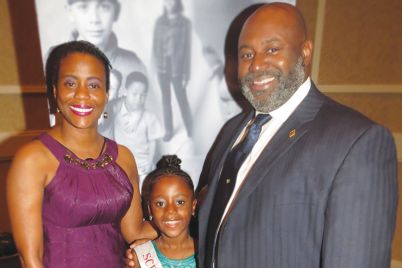Erica Riggins hosted the 47th annual Sickle Cell Benefit Dinner.
BY KARIN DAVIS-THOMPSON | Staff Writer
ST. PETERSBURG — Mary Murph said after discovering that two of her family members were battling sickle cell, she knew she had to find out as much as she could about the disease. She soon realized that there wasn’t nearly enough information available and worked to make sure other families in St. Pete would not have to struggle to find information and help they would need.
“I mounted a worldwide campaign that connected me to scores of people,” Murph said. “Filled with enthusiasm and no resources, I set up the first sickle cell office in my home and got busy putting together programs and services with the community to help our clients.”
According to the Centers for Disease Control, Sickle Cell Disorder (SCD) is a group of inherited red blood cell disorders. Healthy red blood cells are round and move through the small blood vessels to carry oxygen to the body. Someone with SCD has red blood cells that become hard and sticky and look like a C-shaped farm tool called a sickle.
After working tirelessly to bring more awareness to the disease, she founded the St. Petersburg chapter of the Sickle Cell Disease Association of America in 1972, along with William Fleece, an attorney and legislator who worked with her to bring better health care and services to those suffering from the disease.
Now, 47 years later, the association offers a host of services to clients and families, including family support groups, scholarships, genetic counseling, referral services, and recreational enrichment.
As president of the association, Murph spends time in the community, raising awareness and lobbying for more funding to better assist clients and their families. Her hard work has also paved the way for a partnership with John’s Hopkins All Children’s Hospital – working with the hospital to provide transition planning and education to improve the quality of health care for clients in St. Pete.
Recently, the association celebrated National Sickle Cell Awareness Month with the annual Sickle Cell Dinner and Jazz Extravaganza at the St. Petersburg Country Club.
Murph said the event was a sellout and raised thousands of dollars to help clients and their families.
“The funds will be used to defray the cost of the holiday luncheon and gifts for the sickle cell families,” Murph said. “The funds are [also] used for family support, such as emergency assistance, support groups, educational materials, and presentations.”
While there are no other immediate events planned for the near future, Murph said community members could show their support with a donation and taking the time to learn more about the disease – that way, several of the misconceptions about SCD can be eliminated.
Murph said one of the biggest myths is that the disease only attacks African Americans. While the disease may be prevalent in the black community, they are not the only ones to suffer from SCD.
“It does not discriminate based on ethnicity or skin color,” she said. “It occurs more often from regions of the world where malaria is common.”
The retired teacher said it is important to note that the disease is not contagious but is inherited and present at birth.
“It is inherited when a child receives the sickle cell trait from both biological parents,” she said. “It is a lifelong illness that can be managed with treatment. It affects all people differently, and the severity differs from person to person.”
For more information about the sickle cell disease or to donate to the St. Pete Chapter, visit sicklecellstpete.org.
To reach Karin Davis-Thompson, email kdavis-thompson@theweeklychallenger.com








